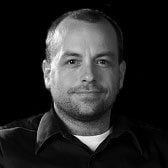Exploring the Meaning of Memories

A version of this story ran in the June 2012 issue.
I don’t believe in the sanctity of a book as a physical object. Sure, I hold my breath when hovering over the Gutenberg Bible at the Harry Ransom Center at UT-Austin, but I’m not shy about marginalia or dog-earing the corners of a contemporary paperback. Still, ripping pages of I Have Blinded Myself Writing This—as the novel’s narrator asks her reader to do and author Jess Stoner asks us to do—hurt something inside of me.
It’s supposed to.
Even if it offered nothing more, Stoner’s fiction provides a unique reading experience. The book is presented as a private journal from a woman casting off her memories, a memoir meant for her daughter’s eyes only. Instead of a stodgy hardcover with wildly hyperbolic blurbs, I Have Blinded Myself Writing This is designed like a plain composition journal. Rather than block after block of stiff prose, Stoner’s book is filled with graphics and drawings to break up the text. Some pages have only a word or two. Some are empty. There are strikethroughs galore.
And commands to the daughter to desecrate the book. “Do it,” the narrator writes, even begs. “Rip this page.”
And I did. I felt weird about it, but I ripped some of those pages right in half. And so will you. Because you’re invested in the story of this unnamed woman who suffers “from an affliction” in which cuts on her body are healed only through the loss of memories. “When my skin breaks,” the narrator writes, “a brief constriction of vessels reduces blood flow to the wound, alerts my brain it must have a memory to activate platelets to form a clot to block the bleeding vessels. My nervous system removes one memory for each breach of epidermis … and a memory is lost.”
Her condition is genetic—her mother suffered from it as well—and so she wants her daughter to be prepared, to know how to handle those moments when a tortilla chip will scrape the roof of her mouth, or she’ll draw blood while flossing, and a memory will disappear. In that way, the book is as much a how-to manual as it is a memoir.
As a reader you’ll feel like a voyeuristic intruder, a Peeping Tom watching through the window as a woman rebels against (or gives in to?) a debilitating disorder, fighting through the simultaneous breakdown of memory and a marriage. When her husband Teddy begs her to “Make a memory of me please,” the narrator writes, “I tell him I will do everything I can. Just before I scrape the back of my arm against the unfinished picnic table.”
Intentionally, perhaps. As the journal progresses, we learn that she sometimes uses her condition for self-torture. Though she can’t choose which memories will disappear to stop the bleeding, she is able to recognize patterns and take advantage of them. She writes, “Sometimes when I’m upset with Teddy I memorize poems to punish myself.” The next time she cuts herself, she’ll likely lose a memory of Teddy and keep the poem.
“To understand,” she writes, “you should rip this page.” In doing so, we come to appreciate how damaging her condition is.
It’s common for a book so intentionally disjointed and obfuscated to ditch the reader early on and spin out of control. But Stoner, Education Programs Coordinator at Austin’s Badgerdog Literary Publishing, maintains an impressive grip on her story, and knows just when and how to tease us into an understanding of the narrator’s condition and her motivations for writing the journal.
I Have Blinded Myself Writing This is not an easy read, and it asks us to devote thought to some difficult questions. Do our memories define us? And if so, what are we left with if those memories disappear? “I wonder if what is filled in is not what was,” the narrator writes. “Is a memory a truth. Is a memory a fact.”
As the narrator continues to shed her memories—and as we continue to destroy the book—we slowly come to some devastating conclusions: about the narrator’s tactics, and about ourselves and the limitations of our memories. And though we’ll want to read the book again, we remember that some of its pages are now missing.
That’s what the narrator has been trying to tell us all along. When looking back on our lives, and our memories, there will always be missing pages.
Observer Fiction Editor David Duhr is co-founder of WriteByNight, a writing center in Austin.


